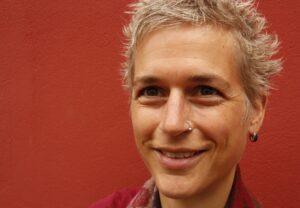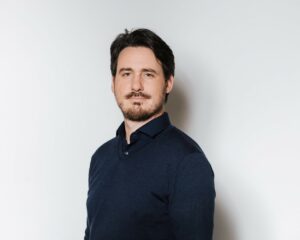Get to Know Our Professors/Lecturers
Do you want to know more about our teaching staff at SDAC? Well, look no further: Prof. Dr. Jean-Baptiste Pettier and PD Dr. Viola Thimm were kind enough to share with us their experiences teaching at SDAC, research interests and more. Read all about our incredible lecturers at SDAC, and what they have to say!
PD Dr. Viola Thimm

Q1: What about the SDAC program interested you and made you choose to teach here?
What about the SDAC program interested you and made you choose to teach here?
What I really like about SDAC is the international environment – my colleagues and our students come from all over the world. This is very inspiring. What I furthermore very much appreciate is the collegiality and the casual interaction. Furthermore, the study program stands out through the intense teaching that we can offer due to our privileged situation as an elite graduate program. Our classes are small which means that everyone is required to engage fully with the material and the course contents. No one can afford to sit back. This leads to very lively, well-founded and engaged discussions and debates in the classroom. However, I’m very well aware that this privileged condition excludes many potential students based on their resources.
Q2. What is your educational background, and how do you connect it with SDAC's themes of decision-making and cultural studies?
What is your educational background, and how do you connect it with SDAC’s themes of decision-making and cultural studies?
I’m a Social and Cultural Anthropologist and Gender Studies scholar. My research interests include cultural practices of im/mobility (especially those of transnational migration, pilgrimage and tourism); gender relations and intersectionality; kinship and family networks; Islam and its socio-cultural entanglements; local economies and consumer culture. My regional focus lies in Southeast Asia (Malaysia and Singapore) and the Arabian Peninsula (United Arab Emirates, Oman), where I have conducted extensive ethnographic fieldwork for over the past sixteen years. I was awarded my Habilitation and Venia Legendi in Anthropology (German qualification for full professorship) in 2021 with my professoral thesis “Shopping with Allah: Muslim Pilgrimage, Gender, and Consumption in Malaysia and Dubai”. I received my doctoral degree in Social and Cultural Anthropology by the University of Göttingen in 2013 with a dissertation on Gender and Educational Migration in Singapore and Malaysia. I furthermore wrote a third book on theoretical-methodological questions of studying intersectionality in transnational contexts (“Narrating intersectional perspectives across social scales”, Routledge 2022). Decision-making directly or indirectly always plays a role when studying social life-worlds as people constantly make all forms of conscious or unconscious decisions: Which route to take to pilgrimage destinations; what to shop on a spiritual journey and for whom; as a parent, to whom do I give my children the indirect mandate to acquire education and status etc. Decision-making is one particular lens amongst many others to understand what people do and why.
Q3. What research are you currently working on?
What research are you currently working on?
My current research project entitled Mapping Sexual Im/Mobilities: Queer Muslim Pilgrimage deals with queer Muslim pilgrimage. Broadly understood as either impossible to be queer and Muslim or as a sin, queer Muslim pilgrimage is a global phenomenon of our times. However, it only gains sketchy attention in mainstream debates on Muslim identities. What is missing is a conceptual understanding of queer Muslim pilgrimage as a basic mode of sexualized mobilities and its consequences for space and place making in Muslim contexts. The objective of this project is to take on this task and work towards a comprehensive im/mobility of gender, sexuality and religion in globalization. It is the first study that identifies queer Muslim pilgrimage extensively.
Q4. What would you like to teach in the future at SDAC?
What would you like to teach in the future at SDAC?
I plan to teach courses related to (critiques of) culture, on reading ethnographic classics, on decoloniality, on gender and embodiment, on queer Asia, on local economies in Southeast Asia… Actually, all this comes with the flow and is also dependent upon the requirements and wishes of the students.
Prof. Dr. Jean-Baptiste Pettier

Q1: What about the SDAC program interested you and made you choose to direct the program?
What about the SDAC program interested you and made you want to direct the program?
This is a very exciting program! To me, two dimensions of it are crucial. The first one is that one of its focus points is the anthropological study of China and of Asia more generally. The anthropological discipline is diverse, and where the regional focus lies depends on academic regions and traditions. However, so-called Chinese societies have not historically been as often a core focus of anthropological research as are south Asian, African or Latin American ones. The grounds behind this gap are historical, but this situation is hard to change, and it makes this program all the more exciting for an anthropologist of China like me. The second dimension which I find truly interesting in this program is how it attempts to question the classical issue of decision-making on the base of social and cultural sciences rather than from a managerial perspective.
Q2. What is your educational background, and how do you connect it with SDAC's themes of decision-making and cultural studies?
What is your educational background, and how do you connect it with SDAC’s themes of decision-making and cultural studies?
I have a very interdisciplinary background. In France, my country of origin, I could study in parallel sociology, anthropology, political sciences and Chinese studies. My will to study all these disciplines in parallel resulted from a deep curiosity for what makes us human and what is behind the differences and common points between all of us. All dimensions, from environmental ones to historical backgrounds, contribute to shape us as we are. This is not to say that we have no personal agency, but rather to acknowledge and attempt to understand how our agency and personal will and capacity to act is strongly shaped by pre-existing conditions. My curiosity for these questions was very strong, and if I could, I would have certainly studied even more disciplines, from medicine to economics, psychology or philosophy. The main reason why I chose to turn into an anthropologist by the end—rather than a specialist in any other discipline—is that it allowed me to touch all of these matters at once, as nothing concerning humans is completely out of the scope of an anthropologist. Yet, it is unfortunately not possible to study everything in every place. Relatively early in my studies, I realized that I had to choose where I wanted to carry out research, as it would take a long time to learn the language and get to understand another society and culture. I chose to focus on China and after that, all my efforts were turned towards the understanding of that society. My PhD research was dedicated to mate choice in the context of marriage markets in urban China, a very classical decision-making issue…
Q3. What research are you currently working on?
What research are you currently working on?
In recent years, my research has explored new paths. In my study of mate choice in urban China, I was very interested in how people deal both with sentimental and material issues. In contemporary societies, most people consider that marriage should be based on romantic love. Yet, marriage is a material issue as well. With whom you share your life and their economic conditions will have an impact on your life. Different societies and social groups deal with these issues in different ways, and this is what I try to understand. In my current research, I somehow pursue this questioning but with a completely different research object: the environment. I work on the global commerce of a protected marine species which is used in traditional Asian medicines. How people who either fish, commerce, use, or engage themselves to protect this species, take the decision to do so has to do with a large number of historical, material and cultural conditions. This is what I try to explore and understand by working with all the involved sides. Thus, I spent the last year in Madagascar in order to work with fishing communities involved in this commerce in order to understand their perspective. I will continue working on this topic in the next years, while leading the SDAC program, and this will be reflected in my teaching.
Q4. What would you like to teach in the future at SDAC?
Could you briefly describe the courses you plan to teach at SDAC?
The classes I have planned conflate my research interests and the core issues of the SDAC program: decision-making and China. For the next semester, my courses will be dedicated respectively to the issue of mate choice and romantic love, the study of contemporary Chinese society, and theories of decision-making across cultural and social analysis. In the next semesters, I intend to develop further classes on moral and ethical questioning, environmental issues, East Asia, as well as on Indian Ocean societies.
Q5. What knowledge and skills do you hope your students will gain?
What knowledge and skills do you hope your students will gain?
I cannot know for sure what students will gain or retain from my classes. Yet, it is my hope that, beyond the specific content of each class, I can encourage them to remain always curious and open to the new and to the different. The world is large, diverse, nuanced, complex, and so should be your ideas and vision.
Q6. What do you think you will bring to SDAC as a director?
What do you think you will bring to SDAC as a director?
A lot of great things already exist in this program, not least the fact that it exists in the first place! As a director, I hope to bring a cohesive spirit, and to reinforce progressively the geographical breadth of the program through the people we invite, particularly in the context of the Guest Lecturer Series. It would interest me as well to give it some non-academic resonance by opening new dialogical formats with the societies we live in and work with.
Q7. Finally, could you please give a message to current and prospective SDAC students?
Finally, could you please give a message to current and prospective SDAC students?
How lucky you are to be at this point of your life! Studying with us will widen your horizon, but you as well will widen ours and the ones of your fellow students by bringing in your own experiences. Those are precious. Youth is not always an easy time, in particular because you have to choose between a lot of options, career paths, potential lifestyles, and that you learn sometimes brutally that not every option is available to you. Yet, every choice will be a good one if it can make you happy, nurture you, and that you give it sense. At SDAC, we will collectively do our best to make sense of the world we live in, so that you can find meaning in your decision to join us.
A huge thank-you goes out to Prof. Dr. Jean-Baptiste Pettier and P.D. Dr. Viola Thimm for making the time for this interview. Our professors hugely impact our program and make it as special as it is.
We would also like to give special thanks to Elsa Schroeder who conducted these interviews.
